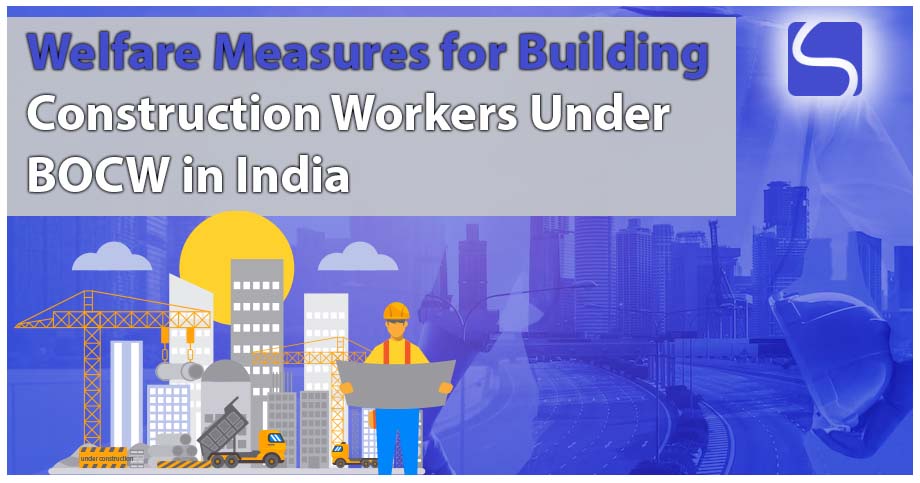Welfare Measures for Building Construction Workers Under BOCW in India

Shivam Narwal | Updated: Mar 10, 2023 | Category: BOCW
Building construction workers are among the most vulnerable and marginalized workers in the world. They work in difficult and dangerous conditions and are often paid very low wages. Due to the nature of their work, they are also at risk of accidents and injuries. Governments and organizations around the world have recognized the need to provide welfare measures for building construction workers to improve their quality of life and protect their rights. The construction industry in India has been growing rapidly in recent years, with a boom in the real estate sector. While the growth of the industry has created numerous employment opportunities for skilled and unskilled workers, it has also brought to light the poor working conditions and lack of basic amenities for the workers. In order to address these issues, the Indian government has introduced several welfare measures for building construction workers under the Building and Other Construction Workers (BOCW) Act, 1996.
Table of Contents
The BOCW Act, 1996
The Building and Other Construction Workers (BOCW) Act, 1996[1] was enacted by the Indian Parliament to regulate the employment and working conditions of building and other construction workers in India. The act defines a construction worker as any person who is employed directly or indirectly in any building or other construction work.
Welfare Measures under the BOCW Act
The BOCW Act provides for the following welfare measures for building construction workers in India:
- Registration of workers: The act mandates the registration of all building and construction workers with the concerned authorities to avail of the benefits provided by the act. The registration is done through a simple process and requires minimal documentation.
- Welfare boards: The act provides for the establishment of welfare boards in every state to oversee the implementation of the provisions of the act. The boards are responsible for the welfare of the workers and the implementation of various welfare schemes.
- Health and safety measures: The act provides for the establishment of health and safety measures at construction sites to ensure the safety and well-being of the workers. This includes the provision of first aid, protective gear, and safety equipment.
- Housing facilities: The act provides for the provision of suitable housing facilities for building construction workers. The government has set up schemes to provide affordable housing to construction workers and their families.
- Education: The act provides for the education of the children of building construction workers. The government has set up schools and hostels for the children of construction workers to ensure that they have access to education.
- Welfare schemes: The act provides for the establishment of welfare schemes for the benefit of building construction workers. These schemes include health insurance, maternity benefits, disability benefits, and pension schemes.
- Skill development: The act provides for the skill development of building construction workers. The government has set up various training programs to train workers in various construction-related skills, including masonry, plumbing, and electrical work.
Importance of Welfare Measures for Building Construction Workers
Welfare measures for building construction workers are important for several reasons:
- Improving Quality of Life: These measures can improve the quality of life of workers by providing them with access to basic amenities like clean water, sanitation facilities, and healthcare.
- Ensuring Social Security: Welfare measures also ensure social security for workers by providing them with access to benefits like insurance, pension schemes, and maternity leave.
- Increasing Productivity: Workers who have access to welfare measures are likely to be more productive and motivated, leading to increased efficiency and profitability for the construction industry.
- Enhancing Safety: Providing workers with safety equipment and training can reduce the risk of accidents and injuries, making the workplace safer for everyone.
- Fulfilling Social Responsibility: Employers have a social responsibility to ensure that their workers are safe and healthy. Providing welfare measures is one way to fulfill this responsibility.
Challenges in Implementing Welfare Measures for Building Construction Workers
Despite the various welfare measures provided under the BOCW Act, there are several challenges in implementing these measures effectively. Some of these challenges include:
- Lack of awareness: Many construction workers are not aware of the welfare measures available to them under the BOCW Act, and hence do not take advantage of them.
- Inadequate funds: The welfare funds provided under the Act are often inadequate to meet the needs of all building and construction workers, leading to a lack of adequate welfare measures.
- Lack of enforcement: The Act is not effectively enforced in many parts of the country, leading to non-compliance with welfare measures.
- Exploitation of workers: Despite the welfare measures provided under the Act, many workers in the construction industry are still exploited by contractors and employers, who fail to provide them with adequate wages, safety measures, and social security benefits.
Solutions to Address Challenges in Implementing Welfare Measures
To address the challenges in implementing welfare measures for building construction workers, several solutions can be adopted:
- Increased awareness: There is a need to increase awareness among workers about the welfare measures available to them under the BOCW Act. This can be done through awareness campaigns, training programs, and workshops.
- Allocation of adequate funds: The government should allocate adequate funds for the implementation of welfare measures under the Act. This will ensure that all workers are able to access the benefits provided by the Act.
- Effective enforcement: There is a need for effective enforcement of the BOCW Act to ensure compliance with welfare measures. This can be done through strict monitoring, inspections, and penalties for non-compliance.
- Strengthening workers’ rights: Workers should be made aware of their rights under the Act and should be encouraged to report any violations of their rights. They should also be provided with legal assistance to fight for their rights.
- Strict action against exploitation: There is a need for strict action against contractors and employers who exploit workers in the construction industry. This can be done through penalties, fines, and cancellation of licenses for non-compliance with welfare measures.
Conclusion
In conclusion, welfare measures for building construction workers under the BOCW Act in India are crucial for ensuring the safety, health, and well-being of workers in the construction industry. The government’s initiatives in this direction have undoubtedly improved the lives of countless workers and their families. However, there is still a long way to go in terms of effective implementation and enforcement of these measures. The challenges faced in implementing the welfare measures must be addressed through a collaborative effort by the government, employers, and workers themselves.
It is important to acknowledge that building construction workers play a significant role in the development of our society, and their contributions should not go unnoticed. Providing them with access to basic amenities and social security is not only the right thing to do, but it also ensures a more productive and efficient workforce. Employers must recognize their social responsibility towards their workers and take steps to ensure their safety and well-being.
By working towards the betterment of building construction workers, we can build a more equitable and inclusive society where everyone has access to basic amenities and social security. Let us continue to strive towards a world where every worker is treated with dignity and respect.
Read our Article:Meaning of Building and Other Construction Workers: An Overview














